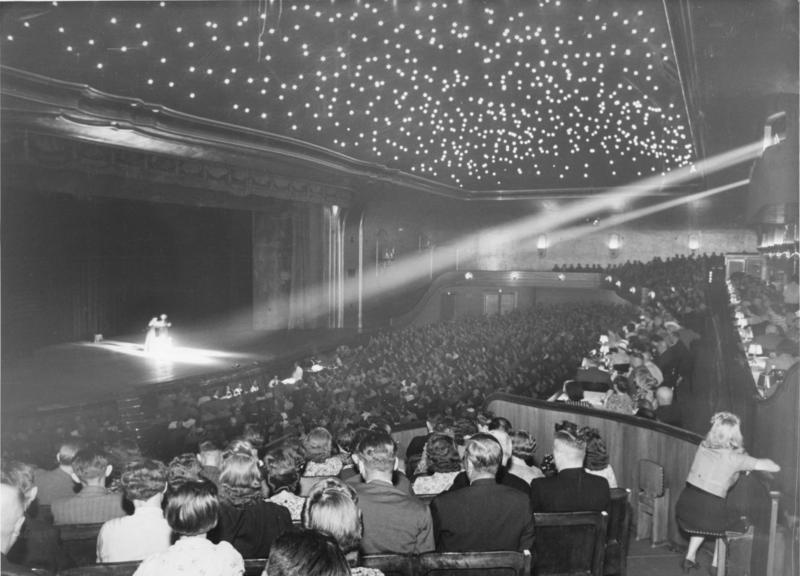|
PAGU
The Projektions-AG Union (generally shortened to PAGU) was a German film production company which operated between 1911 and 1924 during the silent era. From 1917 onwards, the company functioned as an independent unit of Universum Film AG, and was eventually merged into it entirely. The company was founded by Paul Davidson, a leading cinema-owner who branched out into production. Initially it was based in Frankfurt, but quickly moved its headquarters to Berlin as it was clear that this had become the centre of the German film industry. At the time, the majority of films being shown in Germany were foreign-produced, a situation which Davidson attempted to change. One of his first major coups was signing up the Danish film star Asta Nielsen for a lengthy contract. A rising star of the company was also the actor-director Ernst Lubitsch who made a series of comedies for PAGU. PAGU was also notable for its success in breaking a boycott of German playwrights, who were refusing to allow t ... [...More Info...] [...Related Items...] OR: [Wikipedia] [Google] [Baidu] |
Paul Davidson (producer)
Paul Davidson (30 March 1867 – 18 July 1927) was a German film producer. Biography Paul Davidson was born in Lötzen, East Prussia (modern Giżycko, Poland) the son of Moritz Davidson. He initially worked as a commercial traveller in the textile industry and became the manager of a security firm in Frankfurt am Main in 1902. On vacation to Paris he saw his first movie, a Georges Méliès film, in a cinema. Back in Frankfurt he founded the "Allgemeine Kinematographen-Theater Gesellschaft, Union-Theater für lebende und Tonbilder GmbH" (A.K.T.G.) on 21 March 1906 and opened Mannheim’s first permanent cinema, the Union-Theater (U.T.). Further cinemas followed in Frankfurt, Düsseldorf, Cologne, Strasbourg, Amsterdam and Brussels. On 4 September 1909 Davidson opened the Union-Theater at Berlin, Alexanderplatz. Another Union-Theater was opened at Berlin's Unter den Linden on 21 August 1910, by 1910 Davidson had built up a "sizeable chain of 600–1000 seater luxury cinemas".El ... [...More Info...] [...Related Items...] OR: [Wikipedia] [Google] [Baidu] |
Universum Film AG
UFA GmbH, shortened to UFA (), is a film and television production company that unites all production activities of the media conglomerate Bertelsmann in Germany. Its name derives from Universum-Film Aktiengesellschaft (normally abbreviated as ''UFA''), a major German film company headquartered in Babelsberg, producing and distributing motion pictures from 1917 until the end of the Nazi era. The name UFA was revived by Bertelsmann for an otherwise unrelated film and television outfit, UFA GmbH. The original UFA was established as Universum-Film Aktiengesellschaft on December 18, 1917, as a direct response to foreign competition in film and propaganda. UFA was founded by a consortium headed by Emil Georg von Stauß, a former Deutsche Bank board member. In March 1927, Alfred Hugenberg, an influential German media entrepreneur and later Minister of the Economy, Agriculture and Nutrition in Hitler's cabinet, purchased UFA and transferred ownership of it to the Nazi Party in 1933 ... [...More Info...] [...Related Items...] OR: [Wikipedia] [Google] [Baidu] |
Der Gelbe Schein
''Der Gelbe Schein'' (English titles ''The Yellow Ticket'' and ''The Devil's Pawn'') is a 1918 German silent film starring Pola Negri in a double role as Lea and her mother Lydia, Victor Janson as Ossip Storki, and Harry Liedtke as Dimitri. It was directed by Victor Janson and Eugen Illés. Plot Pola Negri plays Lea, a bright adolescent girl who lives in the Jewish ghetto of Warsaw with her ill father. She loves to read, and intends to study medicine at a university in St. Petersburg in the hopes of making her father well again. Her father dies suddenly and her tutor, Ossip Storki, is called away to work for the governor. When she goes to Russia, she learns that Jewish women are only allowed to work as sex workers with the benefit of a "yellow passport", otherwise they will be taken to prison. She applies for a yellow passport and takes up residency at a brothel. Upon finding the identification papers of her tutor's deceased sister Sophie in a book her tutor gave her, Lea applie ... [...More Info...] [...Related Items...] OR: [Wikipedia] [Google] [Baidu] |
Cinema Of Germany
The film industry in Germany can be traced back to the late 19th century. German cinema made major technical and artistic contributions to early film, broadcasting and television technology. Babelsberg became a household synonym for the early 20th century film industry in Europe, similar to Hollywood later. Germany witnessed major changes to its identity during the 20th and 21st century. Those changes determined the periodisation of national cinema into a succession of distinct eras and movements. History 1895–1918 German Empire The history of cinema in Germany can be traced back to the years shortly after the medium's birth. On 1 November 1895, Max Skladanowsky and his brother Emil demonstrated their self-invented film projector, the Bioscop, at the Wintergarten music hall in Berlin. A 15-minute series of eight short films were shown – the first screening of films to a paying audience. This performance pre-dated the first paying public display of the Lumière brothe ... [...More Info...] [...Related Items...] OR: [Wikipedia] [Google] [Baidu] |
Mass Media In Frankfurt
Mass is an intrinsic property of a body. It was traditionally believed to be related to the quantity of matter in a physical body, until the discovery of the atom and particle physics. It was found that different atoms and different elementary particles, theoretically with the same amount of matter, have nonetheless different masses. Mass in modern physics has multiple definitions which are conceptually distinct, but physically equivalent. Mass can be experimentally defined as a measure of the body's inertia, meaning the resistance to acceleration (change of velocity) when a net force is applied. The object's mass also determines the strength of its gravitational attraction to other bodies. The SI base unit of mass is the kilogram (kg). In physics, mass is not the same as weight, even though mass is often determined by measuring the object's weight using a spring scale, rather than balance scale comparing it directly with known masses. An object on the Moon would we ... [...More Info...] [...Related Items...] OR: [Wikipedia] [Google] [Baidu] |
Mass Media In Berlin
Mass is an intrinsic property of a body. It was traditionally believed to be related to the quantity of matter in a physical body, until the discovery of the atom and particle physics. It was found that different atoms and different elementary particles, theoretically with the same amount of matter, have nonetheless different masses. Mass in modern physics has multiple definitions which are conceptually distinct, but physically equivalent. Mass can be experimentally defined as a measure of the body's inertia, meaning the resistance to acceleration (change of velocity) when a net force is applied. The object's mass also determines the strength of its gravitational attraction to other bodies. The SI base unit of mass is the kilogram (kg). In physics, mass is not the same as weight, even though mass is often determined by measuring the object's weight using a spring scale, rather than balance scale comparing it directly with known masses. An object on the Moon would weigh ... [...More Info...] [...Related Items...] OR: [Wikipedia] [Google] [Baidu] |
Mass Media Companies Disestablished In 1924
Mass is an intrinsic property of a body. It was traditionally believed to be related to the quantity of matter in a physical body, until the discovery of the atom and particle physics. It was found that different atoms and different elementary particles, theoretically with the same amount of matter, have nonetheless different masses. Mass in modern physics has multiple definitions which are conceptually distinct, but physically equivalent. Mass can be experimentally defined as a measure of the body's inertia, meaning the resistance to acceleration (change of velocity) when a net force is applied. The object's mass also determines the strength of its gravitational attraction to other bodies. The SI base unit of mass is the kilogram (kg). In physics, mass is not the same as weight, even though mass is often determined by measuring the object's weight using a spring scale, rather than balance scale comparing it directly with known masses. An object on the Moon would weigh le ... [...More Info...] [...Related Items...] OR: [Wikipedia] [Google] [Baidu] |
Mass Media Companies Established In 1911
Mass is an intrinsic property of a body. It was traditionally believed to be related to the quantity of matter in a physical body, until the discovery of the atom and particle physics. It was found that different atoms and different elementary particles, theoretically with the same amount of matter, have nonetheless different masses. Mass in modern physics has multiple definitions which are conceptually distinct, but physically equivalent. Mass can be experimentally defined as a measure of the body's inertia, meaning the resistance to acceleration (change of velocity) when a net force is applied. The object's mass also determines the strength of its gravitational attraction to other bodies. The SI base unit of mass is the kilogram (kg). In physics, mass is not the same as weight, even though mass is often determined by measuring the object's weight using a spring scale, rather than balance scale comparing it directly with known masses. An object on the Moon would weigh les ... [...More Info...] [...Related Items...] OR: [Wikipedia] [Google] [Baidu] |
Film Production Companies Of Germany
A film also called a movie, motion picture, moving picture, picture, photoplay or (slang) flick is a work of visual art that simulates experiences and otherwise communicates ideas, stories, perceptions, feelings, beauty, or atmosphere through the use of moving images. These images are generally accompanied by sound and, more rarely, other sensory stimulations. The word "cinema", short for cinematography, is often used to refer to filmmaking and the film industry, and to the art form that is the result of it. Recording and transmission of film The moving images of a film are created by photography, photographing actual scenes with a movie camera, motion-picture camera, by photographing drawings or miniature models using traditional animation techniques, by means of computer-generated imagery, CGI and computer animation, or by a combination of some or all of these techniques, and other visual effects. Before the introduction of digital production, series of still imag ... [...More Info...] [...Related Items...] OR: [Wikipedia] [Google] [Baidu] |
German Film Studios
German(s) may refer to: * Germany (of or related to) **Germania (historical use) * Germans, citizens of Germany, people of German ancestry, or native speakers of the German language ** For citizens of Germany, see also German nationality law **Germanic peoples (Roman times) * German language **any of the Germanic languages * German cuisine, traditional foods of Germany People * German (given name) * German (surname) * Germán, a Spanish name Places * German (parish), Isle of Man * German, Albania, or Gërmej * German, Bulgaria * German, Iran * German, North Macedonia * German, New York, U.S. * Agios Germanos, Greece Other uses * German (mythology), a South Slavic mythological being * Germans (band), a Canadian rock band * "German" (song), a 2019 song by No Money Enterprise * ''The German'', a 2008 short film * "The Germans", an episode of ''Fawlty Towers'' * ''The German'', a nickname for Congolese rebel André Kisase Ngandu See also * Germanic (other) ... [...More Info...] [...Related Items...] OR: [Wikipedia] [Google] [Baidu] |
Hollywood (film Industry)
The cinema of the United States, consisting mainly of major film studios (also known as Hollywood) along with some independent film, has had a large effect on the global film industry since the early 20th century. The dominant style of American cinema is classical Hollywood cinema, which developed from 1913 to 1969 and is still typical of most films made there to this day. While Frenchmen Auguste and Louis Lumière are generally credited with the birth of modern cinema, American cinema soon came to be a dominant force in the emerging industry. , it produced the third-largest number of films of any national cinema, after India and China, with more than 600 English-language films released on average every year. While the national cinemas of the United Kingdom, Canada, Australia, and New Zealand also produce films in the same language, they are not part of the Hollywood system. That said, Hollywood has also been considered a transnational cinema, and has produced multiple ... [...More Info...] [...Related Items...] OR: [Wikipedia] [Google] [Baidu] |
Pola Negri
Pola Negri (; born Apolonia Chalupec ; 3 January 1897 – 1 August 1987) was a Polish stage and film actress and singer. She achieved worldwide fame during the silent and golden eras of Hollywood and European film for her tragedienne and femme fatale roles and was acknowledged as a sex symbol. Raised in the Congress Kingdom of Poland, Negri's childhood was marked by several personal hardships: After her father was sent to Siberia, she was raised by her single mother in poverty, and suffered tuberculosis as a teenager. Negri recovered, and went on to study ballet and acting in Warsaw, becoming a well-known stage actress there. In 1917, she relocated to Germany, where she began appearing in silent films for the Berlin-based UFA studio. Her film performances for UFA came to the attention of Hollywood executives at Paramount Pictures, who offered her a film contract. Negri signed with Paramount in 1922, making her the first European actress in history to be contracted in Hollyw ... [...More Info...] [...Related Items...] OR: [Wikipedia] [Google] [Baidu] |





.jpg)